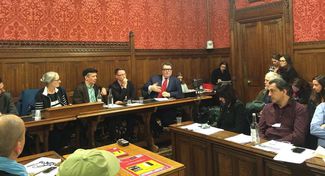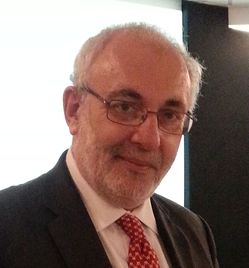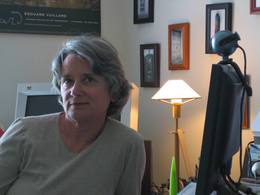Five impossible things before breakfast
One: Monday evening saw a Cybersalon debate at the House of Commons on digital citizenship with the aim of redirecting policy to recognize that "digital citizen" means a lot more than "digital consumer". When, as Cybersalon organizer Eva Pascoe asked not long ago, did the future become something that happens to us rather than something we plan for?  The plan is to spend the next six months working out what "digital citizenship" really means. Meantime, said Tom Watson, the Labour MP for West Bromwich East, with the general election only six weeks away and political party membership dropping in some areas to double digits, it's a good opportunity to join and influence their policy direction.
The plan is to spend the next six months working out what "digital citizenship" really means. Meantime, said Tom Watson, the Labour MP for West Bromwich East, with the general election only six weeks away and political party membership dropping in some areas to double digits, it's a good opportunity to join and influence their policy direction.
Two: Last week's Intelligence and Security Committee report on surveillance was generally taken to give surveillance a pass. While it criticized the laws' opacity and recommended increased accountability and transparency, it said GCHQ's activities were legal. Less discussed is the growing government schizophrenia of advocating both greater infrastructure cybersecurity *and* security service/law enforcement back doors in encryption software and hardware, a desire most explicitly stated by British Prime Minister David Cameron to kick off the electioneering season in January. It's a great example of magical thinking: believing that it's possible to make a hole that only good guys can use.
Three: Instinctively, it's hard not to be outraged on discovering that in 21 US states, lobbying has produced laws banning municipalities from deploying their own public broadband. Last month, the . Apologists for such laws tend to argue that municipal broadband distorts the market and discriminates against smaller ISPs that need the cross-subsidy from municipalities' customers to fund spreading broadband into the surrounding rural areas that municipal broadband won't serve. In a country the size and lack of density of the US, there are plenty of such unincorporated areas, and commercial services are often not particularly interested in serving them either. Rural areas need broadband the most, but unfortunately they generally have the poorest availability - cable doesn't typically go there, and many residences are too far from their nearest exchanges for DSL. But there is another wrinkle: what if the price of free municipal broadband is data privacy? This issue was raised by the Electronic Privacy Information Center as long ago as 2006, but more recently, Purple Wifi made a deal with the City of York that the city boasts gives it data to analyze and share with local businesses. Economic realities mean that the people with the least choice, the people government should be protecting, will be the ones least able to opt out.
Four: "What should the BBC do?" The person asking me was a BBC researcher who had asked me to speak to a bunch of his colleagues in February. First thought: you're asking *me*? Further thoughts followed immediately. More or less in order:
- Save the license fee;
- Understand itself as not just a "broadcaster" but as part of a conversation;
- Grow its own stars by sharing and teaching skills;
- Provide public access to studios, both radio and TV, much the way US municipalities required cable companies to do as a condition of licensing. Sure, that let to many 1980s programs mocked in movies and on sitcoms, but it continues today and also led to some good stuff (much like the internet). Even if YouTube's terms and conditions weren't changing, why should it be the preferred location for UK creators' content?;
- Foster genuinely local television, perhaps through peer-to-peer;
- Stop buying programs from Rupert Murdoch.
Five: The tiny cul-de-sac I live on is having a dispute with the residents of a much larger street across the railway line and running alongside it (where we dead-end into it). At issue is their desire not to look at graffiti murals sprawled over the sides of our houses versus our desire not to have an 11-foot fence blocking the light from the end of the street. Or, to be more precise, a newly-built six-foot fence built above an existing five-foot brick wall. Disputes like these, where no one is particularly wrong but where competing interests collide, is why you need someone - in this case, local councillors - to come in and try to balance the competing demands. Unfortunately for us, the population that hates graffiti has been complaining copiously for ten years and is a lot larger and noisier than the population of our small street, who would just like our light and the look of our street back and didn't have anything to complain about until last week. (The lack of consultation is a separate issue.) When we talk about governance on the internet and the rights of digital citizens, this is the kind of balancing act we will need to create structures to enable. Most net.wars are more directly opposed: the trauma of public shaming and abuse versus the right to freedom of expression; rights holders versus file-sharers; open versus closed. If we want real digital public spaces, we will need more nuanced arbiters than today's take-it-or-leave-it contracts imposed without negotiation by corporate owners.
Wendy M. Grossman is the 2013 winner of the Enigma Award. Her Web site has an extensive archive of her books, articles, and music, and an archive of earlier columns in this series. Stories about the border wars between cyberspace and real life are posted occasionally during the week at the net.wars Pinboard - or follow on Twitter.

 Coyle goes on to ask why counting sales or links is seen as neutral while "attempting to make a selection of the most important works in a subject area within a limited budged is looked at askance." The notion of algorithmic neutrality has been thoroughly challenged, most recently by University of Maryland professor Frank Pasquale in his book
Coyle goes on to ask why counting sales or links is seen as neutral while "attempting to make a selection of the most important works in a subject area within a limited budged is looked at askance." The notion of algorithmic neutrality has been thoroughly challenged, most recently by University of Maryland professor Frank Pasquale in his book 